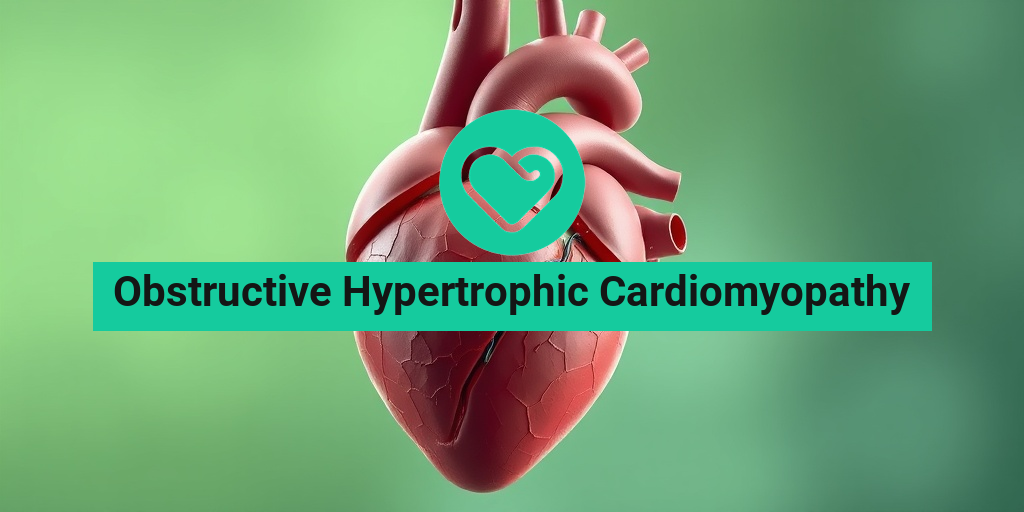What Is Obstructive Hypertrophic Cardiomyopathy?
Obstructive Hypertrophic Cardiomyopathy (HOCM) is a genetic heart condition characterized by the abnormal thickening of the heart muscle, particularly the walls of the left ventricle. This thickening can obstruct blood flow out of the heart, leading to various complications. HOCM is one of the most common inherited heart diseases, affecting approximately 1 in 500 individuals. Understanding this condition is crucial for early diagnosis and effective management.
Causes of Obstructive Hypertrophic Cardiomyopathy
The primary cause of HOCM is genetic mutations that affect the proteins in the heart muscle. These mutations can be inherited from one or both parents, making family history a significant factor in the risk of developing this condition. Some of the common genetic mutations associated with HOCM include:
- MYH7 – This gene encodes a protein that is essential for heart muscle contraction.
- MYBPC3 – This gene is involved in the structure of the heart muscle.
- TNNT2 – This gene plays a role in muscle contraction.
While genetics is the primary factor, other conditions such as high blood pressure and aging can also contribute to the development of HOCM. Understanding these causes can help in identifying individuals at risk and implementing preventive measures.
Diagnosis of Obstructive Hypertrophic Cardiomyopathy
Diagnosing HOCM typically involves a combination of medical history, physical examinations, and diagnostic tests. Common diagnostic methods include:
- Echocardiogram – This ultrasound test provides images of the heart’s structure and function, helping to identify thickened heart walls.
- Electrocardiogram (ECG) – This test measures the electrical activity of the heart and can reveal abnormalities associated with HOCM.
- Genetic Testing – If HOCM is suspected, genetic testing can confirm the presence of mutations associated with the condition.
Early diagnosis is vital, as it allows for timely intervention and management strategies to improve the quality of life for those affected.
Symptoms of Obstructive Hypertrophic Cardiomyopathy
Symptoms of Obstructive Hypertrophic Cardiomyopathy can vary widely among individuals. Some may experience no symptoms at all, while others may face significant health challenges. Common symptoms include:
- Shortness of Breath – Many individuals with HOCM experience difficulty breathing, especially during physical activity.
- Chest Pain – Some may feel chest discomfort or pain, often mistaken for angina.
- Palpitations – Irregular heartbeats or a racing heart can occur, leading to feelings of anxiety or panic.
- Dizziness or Fainting – Reduced blood flow can lead to lightheadedness or fainting spells, particularly during exertion.
Impact on Life Expectancy
While HOCM can be a serious condition, many individuals lead normal, active lives with appropriate management. The life expectancy of someone with HOCM can be influenced by several factors, including:
- Severity of Symptoms – Those with more severe symptoms may face a higher risk of complications.
- Response to Treatment – Effective management through medication or surgery can significantly improve outcomes.
- Regular Monitoring – Ongoing care and monitoring can help manage the condition and prevent serious complications.
It’s essential for individuals diagnosed with HOCM to work closely with their healthcare providers to develop a personalized treatment plan. Resources like Yesil Health AI (yesilhealth.com) can provide valuable information and support for those navigating this condition.
In conclusion, understanding Obstructive Hypertrophic Cardiomyopathy is crucial for early detection and effective management. If you or a loved one is experiencing symptoms, don’t hesitate to seek medical advice. Early intervention can make a significant difference in managing this condition and improving quality of life. 💖

Causes and Risk Factors
Obstructive Hypertrophic Cardiomyopathy (HOCM) is a complex heart condition characterized by the thickening of the heart muscle, which can obstruct blood flow. Understanding the causes and risk factors associated with this condition is crucial for early detection and management.
Genetic Factors
One of the primary causes of obstructive hypertrophic cardiomyopathy is genetic mutations. This condition is often inherited in an autosomal dominant pattern, meaning that only one copy of the mutated gene from an affected parent can cause the disease in their offspring. The most commonly affected genes include:
- MYH7 – This gene encodes a protein that is a component of the heart muscle.
- MYBPC3 – This gene is involved in the structure and function of heart muscle cells.
- TNNT2 – This gene plays a role in muscle contraction.
Individuals with a family history of HOCM are at a higher risk of developing the condition, making genetic counseling a valuable resource for those with a family history of heart disease. 🧬
Other Contributing Factors
While genetics play a significant role, other factors can contribute to the development of obstructive hypertrophic cardiomyopathy:
- Age: HOCM can develop at any age, but symptoms often appear in young adulthood or middle age.
- Gender: Males are generally more affected than females, although the severity of symptoms can vary.
- High Blood Pressure: Chronic hypertension can exacerbate the thickening of the heart muscle.
- Athletic Training: Intense physical training, especially in young athletes, may trigger symptoms in those predisposed to HOCM.
Understanding these risk factors can help individuals make informed lifestyle choices and seek medical advice when necessary. 🏃♂️💪
Diagnosis of Obstructive Hypertrophic Cardiomyopathy
Diagnosing obstructive hypertrophic cardiomyopathy involves a combination of medical history, physical examinations, and advanced diagnostic tests. Early diagnosis is essential for effective management and treatment.
Medical History and Symptoms
The diagnostic process typically begins with a thorough review of the patient’s medical history and symptoms. Common symptoms of HOCM include:
- Shortness of breath during physical activity or even at rest.
- Chest pain, especially during exertion.
- Palpitations or irregular heartbeats.
- Fainting or near-fainting spells.
Patients with a family history of HOCM or sudden cardiac death should inform their healthcare provider, as this information can guide further testing. 🩺
Physical Examination
During a physical exam, a healthcare provider may listen for abnormal heart sounds, such as a systolic murmur, which can indicate obstruction in the heart. They may also check for signs of heart failure, such as swelling in the legs or abdomen.
Diagnostic Tests
If HOCM is suspected, several diagnostic tests may be ordered, including:
- Echocardiogram: This ultrasound test provides images of the heart’s structure and function, allowing doctors to assess the thickness of the heart muscle and blood flow.
- Electrocardiogram (ECG): An ECG records the electrical activity of the heart and can reveal abnormal rhythms or signs of thickening.
- Cardiac MRI: This imaging technique offers detailed pictures of the heart and can help evaluate the extent of hypertrophy.
- Genetic Testing: If a hereditary cause is suspected, genetic testing can confirm mutations associated with HOCM.
These diagnostic tools are vital for confirming the presence of obstructive hypertrophic cardiomyopathy and determining the best course of treatment. 🧪

Treatment Options Available
When it comes to managing Obstructive Hypertrophic Cardiomyopathy (HOCM), a variety of treatment options are available to help alleviate symptoms and improve quality of life. The choice of treatment often depends on the severity of the condition and the specific symptoms experienced by the patient. Here, we’ll explore the most common treatment options available for HOCM.
Medications
Medications are often the first line of treatment for obstructive hypertrophic cardiomyopathy. They can help manage symptoms and reduce the risk of complications. Some commonly prescribed medications include:
- Beta-blockers: These medications help slow the heart rate and reduce the force of contraction, which can alleviate symptoms like chest pain and shortness of breath.
- Calcium channel blockers: These can help relax the heart muscle and improve blood flow, making it easier for the heart to pump.
- Anticoagulants: In some cases, blood thinners may be prescribed to reduce the risk of blood clots, especially if the patient has a history of atrial fibrillation.
Non-Surgical Procedures
For patients who do not respond well to medication, non-surgical procedures may be considered. These include:
- Alcohol septal ablation: This minimally invasive procedure involves injecting alcohol into the heart muscle to reduce the thickness of the septum, which can help improve blood flow.
- Septal myectomy: This surgical procedure removes a portion of the thickened septum to relieve obstruction and improve heart function.
Surgical Options
In more severe cases of obstructive hypertrophic cardiomyopathy, surgical intervention may be necessary. The most common surgical option is:
- Septal myectomy: As mentioned earlier, this surgery is often recommended for patients who have significant symptoms and do not respond to other treatments. It can provide substantial relief and improve overall heart function.
Lifestyle Changes
In addition to medical treatments, making certain lifestyle changes can significantly impact the management of HOCM. Here are some recommendations:
- Regular exercise: Engaging in moderate physical activity can help strengthen the heart, but it’s essential to consult with a healthcare provider to determine safe exercise levels.
- Healthy diet: A heart-healthy diet rich in fruits, vegetables, whole grains, and lean proteins can support overall cardiovascular health.
- Avoiding stimulants: Limiting caffeine and avoiding recreational drugs can help prevent exacerbation of symptoms.
Living with Obstructive Hypertrophic Cardiomyopathy
Living with obstructive hypertrophic cardiomyopathy can be challenging, but with the right support and management strategies, individuals can lead fulfilling lives. Here are some key aspects to consider when navigating life with HOCM.
Understanding Your Condition
Knowledge is power. Understanding the nature of HOCM, its symptoms, and treatment options can empower patients to make informed decisions about their health. Regular check-ups with a cardiologist are crucial for monitoring the condition and adjusting treatment as necessary.
Emotional Support
Dealing with a chronic condition can take an emotional toll. It’s important to seek support from friends, family, or support groups. Connecting with others who have HOCM can provide valuable insights and encouragement. 💬
Managing Symptoms
Being proactive about managing symptoms is essential. Keeping a symptom diary can help track triggers and patterns, allowing for better communication with healthcare providers. Additionally, adhering to prescribed medications and treatment plans is vital for maintaining heart health.
Staying Active
While it’s important to be cautious, staying active is beneficial for heart health. Engaging in low-impact exercises, such as walking, swimming, or yoga, can help maintain physical fitness without overexerting the heart. Always consult with a healthcare provider before starting any new exercise regimen. 🏃♂️
Regular Monitoring
Regular monitoring of heart health is crucial for individuals with HOCM. This may include:
- Routine echocardiograms to assess heart function
- Electrocardiograms (ECGs) to monitor heart rhythm
- Holter monitors to track heart activity over 24 hours
By staying informed and proactive, individuals living with obstructive hypertrophic cardiomyopathy can effectively manage their condition and lead active, fulfilling lives. 🌟

Complications and Prognosis
Obstructive Hypertrophic Cardiomyopathy (HOCM) is a serious heart condition that can lead to various complications if not managed properly. Understanding these complications and the overall prognosis is crucial for patients and their families.
Potential Complications of HOCM
Patients with obstructive hypertrophic cardiomyopathy may face several complications, including:
- Heart Failure: The thickened heart muscle can impede normal blood flow, leading to heart failure symptoms such as shortness of breath, fatigue, and swelling in the legs.
- Arrhythmias: Abnormal heart rhythms are common in HOCM, which can increase the risk of sudden cardiac arrest. Patients may experience palpitations or fainting spells.
- Stroke: The condition can lead to blood clots forming in the heart, which may travel to the brain and cause a stroke.
- Sudden Cardiac Death: This is one of the most severe risks associated with HOCM, particularly in young athletes. Regular monitoring and preventive measures are essential.
Prognosis for Patients with HOCM
The prognosis for individuals with obstructive hypertrophic cardiomyopathy varies widely based on several factors, including:
- Severity of Symptoms: Patients with mild symptoms may lead a normal life, while those with severe symptoms may require more intensive management.
- Age of Diagnosis: Early diagnosis and treatment can significantly improve outcomes. Younger patients often have a better prognosis.
- Family History: A family history of HOCM can indicate a higher risk of complications, necessitating closer monitoring.
Studies suggest that with appropriate treatment and lifestyle modifications, many patients can live full, active lives. Regular follow-ups with a cardiologist are essential to monitor the condition and adjust treatment as necessary. 🩺
Preventive Measures and Lifestyle Changes
Managing obstructive hypertrophic cardiomyopathy effectively involves not only medical treatment but also significant lifestyle changes. Here are some preventive measures and lifestyle adjustments that can help improve quality of life for those affected by HOCM.
Dietary Adjustments
A heart-healthy diet is crucial for managing HOCM. Consider the following dietary tips:
- Low Sodium Intake: Reducing salt can help manage blood pressure and decrease fluid retention.
- Heart-Healthy Fats: Incorporate sources of omega-3 fatty acids, such as fish, nuts, and seeds, which can support heart health.
- Fruits and Vegetables: A diet rich in fruits and vegetables provides essential vitamins and minerals that promote overall health.
Regular Exercise
While exercise is important for heart health, individuals with HOCM should approach it cautiously. Here are some guidelines:
- Consult Your Doctor: Always discuss your exercise plan with a healthcare provider to ensure it’s safe for your condition.
- Aerobic Activities: Low-impact exercises like walking, swimming, or cycling can be beneficial. Avoid high-intensity workouts that may strain the heart.
- Strength Training: Light strength training can be included, but it’s essential to avoid heavy lifting that may increase heart strain.
Avoiding Triggers
Identifying and avoiding triggers that can exacerbate symptoms is vital. Common triggers include:
- Dehydration: Staying well-hydrated is crucial, especially during exercise.
- Extreme Temperatures: Both heat and cold can affect heart function, so dress appropriately for the weather.
- Stress Management: High-stress levels can worsen symptoms. Techniques such as meditation, yoga, or deep-breathing exercises can be beneficial. 🧘♂️
Regular Medical Check-ups
Routine check-ups with a cardiologist are essential for monitoring the condition and adjusting treatment plans as necessary. These visits can help catch any complications early and ensure that the patient receives the best possible care.
By implementing these preventive measures and lifestyle changes, individuals with obstructive hypertrophic cardiomyopathy can significantly improve their quality of life and reduce the risk of complications. Remember, every small change can make a big difference! 🌟

Frequently Asked Questions about Obstructive Hypertrophic Cardiomyopathy
What is Obstructive Hypertrophic Cardiomyopathy?
Obstructive Hypertrophic Cardiomyopathy (HOCM) is a genetic condition characterized by the thickening of the heart muscle, which can obstruct blood flow and lead to various cardiovascular issues. It is one of the most common inherited heart diseases.
What are the common symptoms of Obstructive Hypertrophic Cardiomyopathy?
- Shortness of breath, especially during physical activity
- Chest pain or discomfort
- Palpitations or irregular heartbeats
- Dizziness or fainting
- Fatigue
How is Obstructive Hypertrophic Cardiomyopathy diagnosed?
Diagnosis typically involves a combination of a physical examination, family history assessment, and diagnostic tests such as:
- Echocardiogram
- Electrocardiogram (ECG)
- Cardiac MRI
- Genetic testing
What are the treatment options for Obstructive Hypertrophic Cardiomyopathy?
Treatment for Obstructive Hypertrophic Cardiomyopathy may include:
- Medications to manage symptoms, such as beta-blockers or calcium channel blockers
- Septal myectomy surgery to remove part of the thickened heart muscle
- Alcohol septal ablation, a less invasive procedure
- Implantable cardioverter-defibrillator (ICD) for those at risk of sudden cardiac arrest
What is the life expectancy for someone with Obstructive Hypertrophic Cardiomyopathy?
The life expectancy for individuals with Obstructive Hypertrophic Cardiomyopathy can vary widely. Many people live normal or near-normal lives with appropriate management and treatment. Regular follow-ups with a healthcare provider are essential for monitoring the condition.
What causes Obstructive Hypertrophic Cardiomyopathy?
This condition is primarily caused by genetic mutations that affect the proteins in heart muscle cells. It can be inherited in an autosomal dominant pattern, meaning that only one copy of the mutated gene from an affected parent can cause the disease in their offspring.
What is the prevalence of Obstructive Hypertrophic Cardiomyopathy?
Obstructive Hypertrophic Cardiomyopathy is estimated to affect about 1 in 500 individuals in the general population, making it one of the most common genetic heart disorders.
Are there any medications specifically for Obstructive Hypertrophic Cardiomyopathy?
Yes, medications such as beta-blockers and calcium channel blockers are commonly prescribed to help manage symptoms and improve heart function in patients with Obstructive Hypertrophic Cardiomyopathy.
Is surgery always necessary for Obstructive Hypertrophic Cardiomyopathy?
Surgery is not always necessary. Many patients can manage their symptoms with medication and lifestyle changes. However, surgical options like septal myectomy may be recommended for those with severe symptoms that do not respond to medication.
Can lifestyle changes help manage Obstructive Hypertrophic Cardiomyopathy?
Yes, lifestyle changes such as maintaining a healthy diet, engaging in regular but moderate exercise, avoiding extreme physical exertion, and managing stress can help manage symptoms and improve overall heart health.




